Adopting new technology to meet ambitious targets
12th September 2024
The Summer Berry Company, which produces 7,000 tonnes of fruit in the UK a year, has adopted robotics and green energy solutions to help it meet its sustainability goals – and it’s got big expansion plans in the next few years. Sarah Kidby reports.
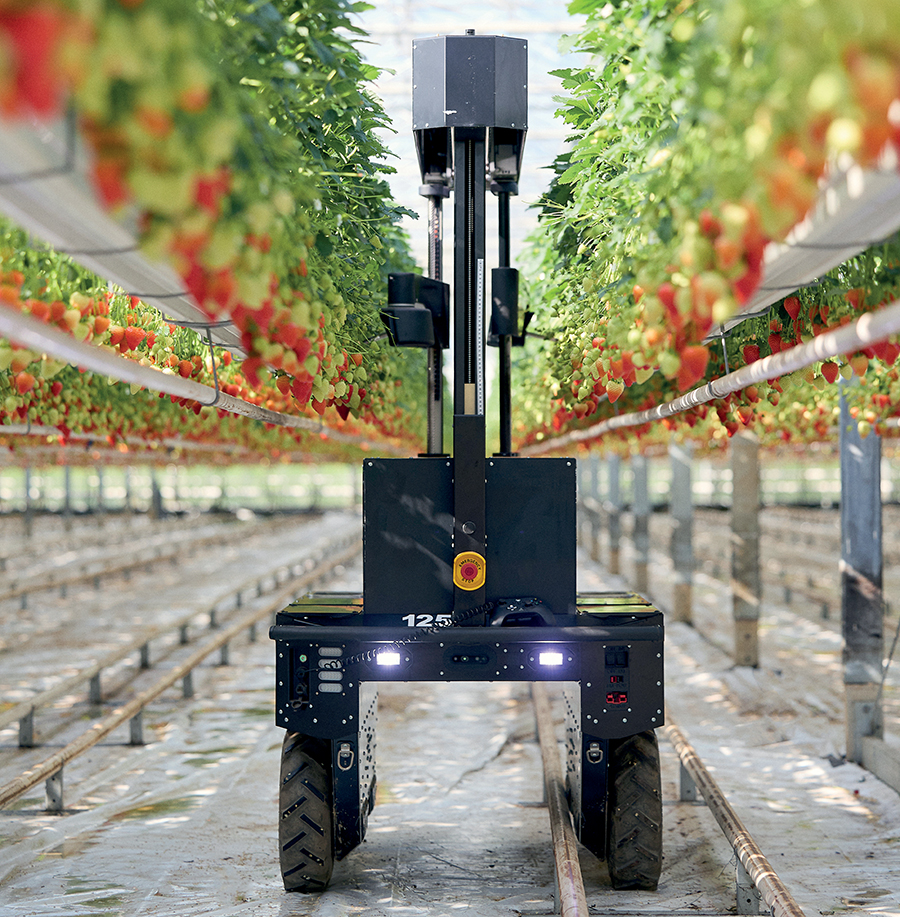
Sustainability and decarbonisation are key watchwords for The Summer Berry Company (TSBC), which has invested in various new technologies including a green energy solution to extend the strawberry season, and using robots for various farm tasks.
The business has farms in both the UK and Portugal – with its UK fruit predominantly going to major retailers such as Tesco, M&S, Waitrose, ASDA, Ocado, and Aldi. Around 4–5% of its total sales this year will be to international markets – Germany, the Middle East and Japan – but this figure is set to rise next year.
TSBC grows over 6,000 tonnes of strawberries, 750 tonnes of blueberries and a small amount of blackberries in the UK each year. It is not producing raspberries in the UK in 2024, but offers year-round supply of raspberries in Portugal.
As part of its sustainability strategy, tackling waste fruit is an important focus, and something its environmental, social and governance (ESG) manager is actively working on. It has a partnership with Chichester Food and Drink Company, which preserves surplus fruit and turns it into high quality, intensely flavoured new products, giving fruit waste a second life.
The business also has an open-door policy to local schools, universities, associations, community groups, etc – all they need to do is get in touch to schedule their visit.
TSBC’s farms date back to the 1960s and are grounded in traditional British farm life. After being acquired by Cibus Fund, a private equity investment fund with headquarters in London, TSBC was formed in 2019 and its current CEO David Sanclement joined in 2020. He began his career in Spain, his home country, before moving to Belgium and Germany, then settling in the UK. His long career in the fresh produce industry includes operations and finance roles for global fruit producers, which has taken him around Europe.
Variety choice
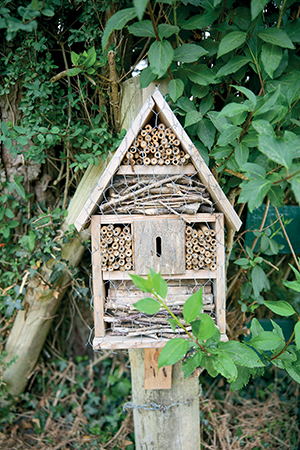
Flavour, aesthetic appearance and shelf-life are the critical attributes for TSBC’s variety selection. “We know that it is these characteristics that make our berries so enjoyable and keep consumers coming back for more,” David explains.
“But it is also vital that these characteristics align with the agronomic parameters of yield, harvest speeds and disease tolerances. This enables The Summer Berry Company to achieve its critical objective of growing berries sustainably, ensuring our customers get a product which not only tastes fantastic but is also grown responsibly.”
TSBC recently scooped two Superior Taste awards for its Fandango strawberry and Amalia Rossa raspberry varieties. The judging panel is composed of more than 200 professional taste experts, with a focus on flavour, appearance, texture, and aroma.
Fandango is a top tier strawberry variety created by Fresh Forward, an expert breeder based in The Netherlands; Amalia Rossa is a premium raspberry variety created by the experienced Italian breeder BerryTech. The Summer Berry Company holds the exclusive rights to sell Amalia Rossa grown in Portugal to British and Irish retailers. With an annual production of more than 1,500 tonnes, it also sells Amalia Rossa grown in Portugal to European markets and the Middle East.
A full-year crop planning is an increasingly critical element to the business, David adds. “We strive to take advantage of our geographical location for our field crops and our glasshouse production is timed to come on both shoulders of the main UK season. It’s also important to take into account the availability of labour and to ensure our volume profiling throughout the year does not exceed our labour capacity.”
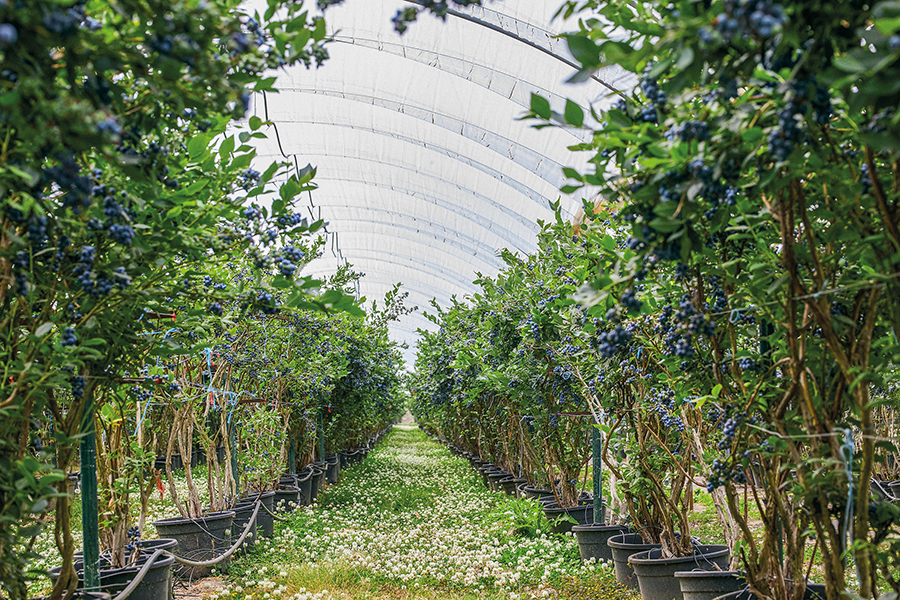
Primary tasks
There are six primary tasks the production team focus heavily on throughout each year. Firstly, ensuring the correct types of plants and varieties are planted at the correct time of year, in the most suitable locations. Secondly, ensuring all plants are grown optimally at all times, and that the climate conditions are adjusted to suit the time of the year, the stage of growth and the current market situation.
Limiting the impact of pest and disease through varietal selection and timing is also key, as well as: climate control; timely crop management plans; robust monitoring, prediction and identification strategies and a clear IPM strategy.
Another priority is precision irrigation and fertigation strategies, ensuring the crops have exactly what they need when they need it, at all stages of their life cycle. And finally, maximising fruit quality, flavour and timing; and timely harvesting to ensure the fruit is at its absolute best when it reaches the customer.
Pests and disease
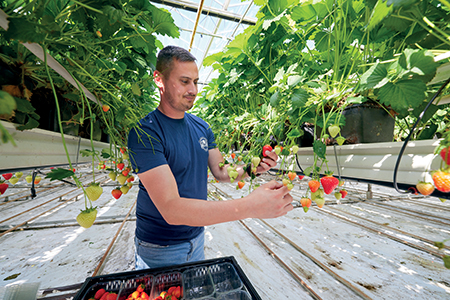
Powdery mildew is a key issue for the farms’ strawberries and UVC treatment is used for the most susceptible varieties. They also use a timed pesticide treatment programme in addition to regular and timely crop management. Active climate monitoring and control forms part of the strategy. And for pests, they implement rigorous and timely IPM strategies including regular preventative bio-control applications as well as spot curative treatments. Two bio-applicator machines have been out in the fields this year for timely applications and reduced labour requirement.
The farms do a lot of their agronomy practices in house, ranging from fertigation recipes and spray programmes to prediction modelling and flower mapping.
“We strongly believe in investing in our growers and production staff, equipping them with the knowledge and experience to manage the day-to-day complexities and challenges that come with soft fruit farming,” David comments. TSBC also utilises external agronomy services, which provide valuable insights and learning.
For pollination, the farms use a local beekeeper who provides around 150 honeybee hives, each containing about 10,000 bees – and they are introducing native bumblebees throughout the crops as part of TSBC’s biodiversity push.
Weather resilience
As is the case for all growers, the increasingly unpredictable weather creates another set of issues to be managed. “The lack of light this year has been particularly disruptive to our crops and has made profiling and timing a challenge,” David comments.
“Changeable weather conditions year on year make it difficult to really track historical crop specific performance and to fully understand the incremental gains that we strive to achieve. It’s the same for all areas of horticulture and agriculture and we must remain resilient to the challenges that the weather brings.”
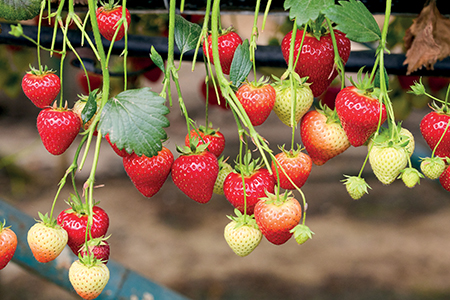
Meanwhile, frost risk is a critical area for the farms’ blueberry crops, due to the very short timeframe for the open flowers to be pollinated.
“Sprinkler systems are used to cover the flowers and bushes with ice – the ice encasement shields the flowers from harsher temperatures and the freezing process itself, then releases latent heat which creates a ‘warmer’ microclimate around the flower, preventing frost damage,” David explains.
Other crops are planted in sealed tunnels and covered with single/double layers of fleece and mulch during frost events. Crops are normally covered during the day of a predicted frost to trap warmer air and residual heat within the crop.
Specific biostimulants are also applied to the crop prior to a frost. “Some products enhance the plants’ natural defence mechanisms to resist frosting damage, whilst others create a semi-permeable elastic membrane around the plants, providing a physical protective barrier,” he continues.
High rehiring rates
Whilst labour is a key issue for many growers, TSBC sources its labour directly – these are returnees who have EUSS settled and pre-settled status – and via Seasonal Workers Pilot Scheme Operators which is on a six-month visa.
“We have established good working relationships over the years with the Pilot Scheme Operators and have enough labour to pick and pack our crops and complete any other jobs,” David says. “Our strategy is to rehire each year and we have a success rate between 50–65%.”
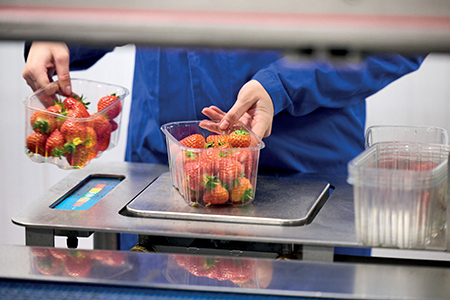
They also recruit new workers every year and have a training programme for both new workers and returnees, according to their specific needs. The peak season tends to be from May until September, but there are shoulder seasons in the glasshouse before and after that.
The business also currently has 75 permanent employees working from the UK.
Nearly 100% of the company’s fruit is packaged on site, the only exception being where some customers prefer to pack themselves. “Because of our significant packing capacity (1.5M units per week), we are also exploring the possibility of packing for third-party companies during the winter months, when the amount of fruit we produce is lower,” David adds.
Additionally, all the farms’ machinery is bought new – including its tractors, forklifts, and a blueberry grader, to name a few examples.
New technology
Among a number of new technologies adopted by TSBC, it has developed a green energy solution (GES) in the glasshouse which will allow it to produce British strawberries all year round, starting this winter. The move will reduce overall spend on energy by around 40%, cut CO2 emissions by 20%, and allow the site to provide extensive additional lighting to the crop in winter.
Additionally, it has partnerships with Tortuga Agtech and Saga Robotics, which has seen the business incorporate robots onto the farms. They do jobs such as harvesting strawberries, providing forecasting on yields and plant health, as well as providing support to its agronomists in fighting pests via UV light application.
Plans for growth
“We have a growth plan to increase the production in our current farms in the UK and Portugal but also expand our business to other geographies,” David shares.
Glasshouse production in the UK will increase by 40% until 2028, and in Portugal, its raspberry production will be expanded by working with associated growers, to best serve the markets. There are also expansion plans in South Africa and Morocco, which should be completed by 2025.
“This diversification of geographies will allow us to support our strategy of year-round direct supply of premium genetics to premium retailers,” David explains.
And finally, one of the company’s main focuses for the future is further developing its sustainability programme and achieving decarbonisation by 2030.
Learn more about The Summer Berry Company here.
Grower profile
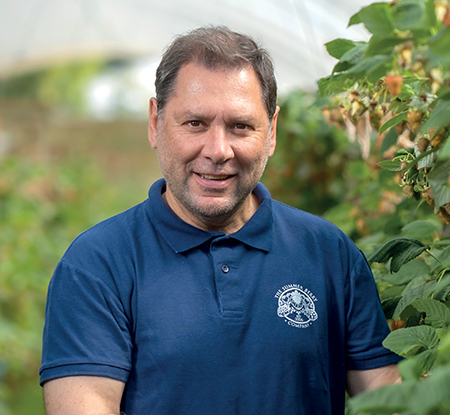
Farm owner/manager: Chief executive officer, David Sanclement
Location: Three farms in the south of England, near Chichester, West Sussex, and farms in Portugal
Total size in ha: UK: 156ha of glasshouse and outdoor crops
Fruits grown: Strawberries, blueberries, blackberries, raspberries
Varieties grown (excluding trials): Strawberries: Karima, Ania, Murano, Favori, Malling Centenary, Fandango, Parlando Blueberries: Duke, Valor, Top Shelf Blackberries: Sweet Royalla
Read more grower profiles
Read more fruit news
